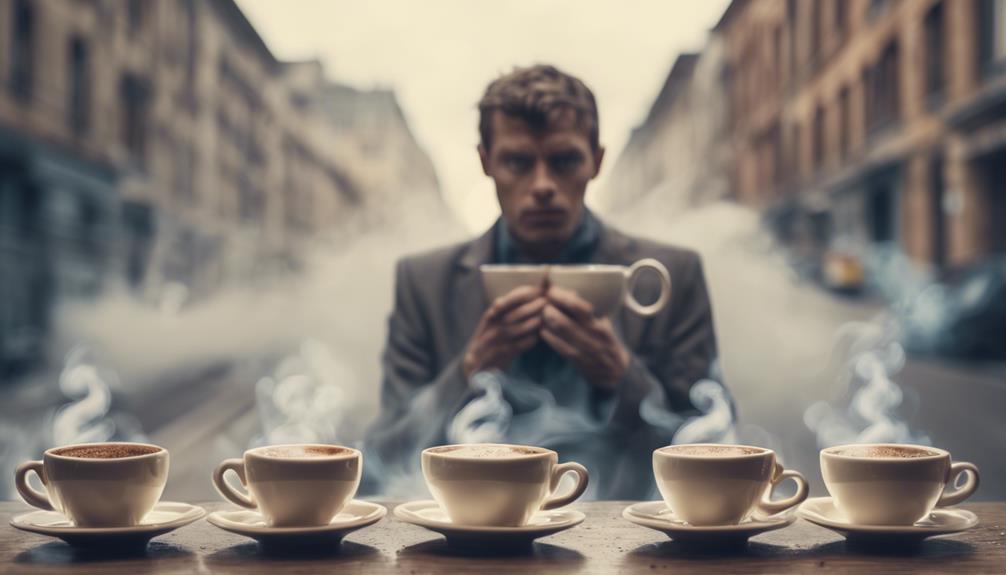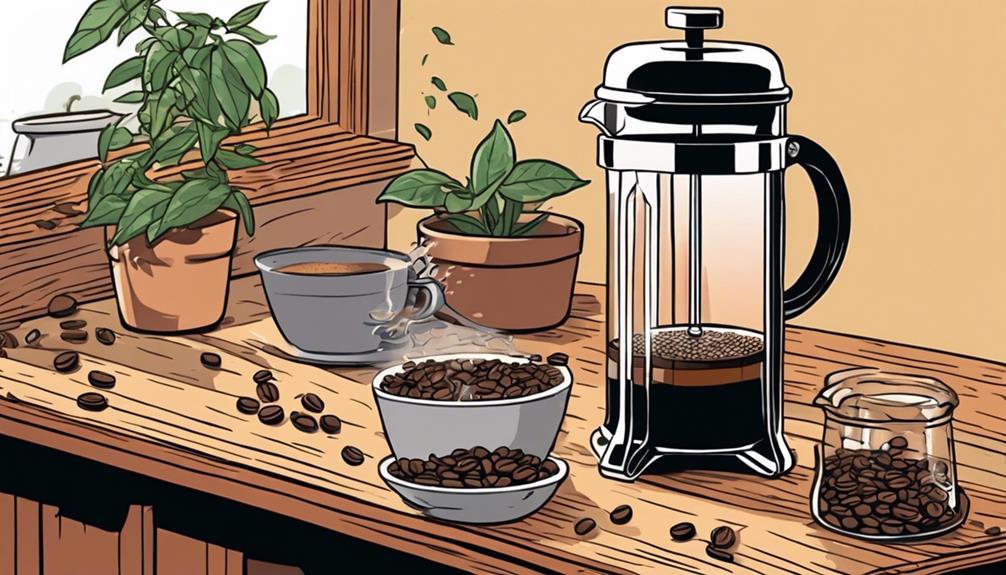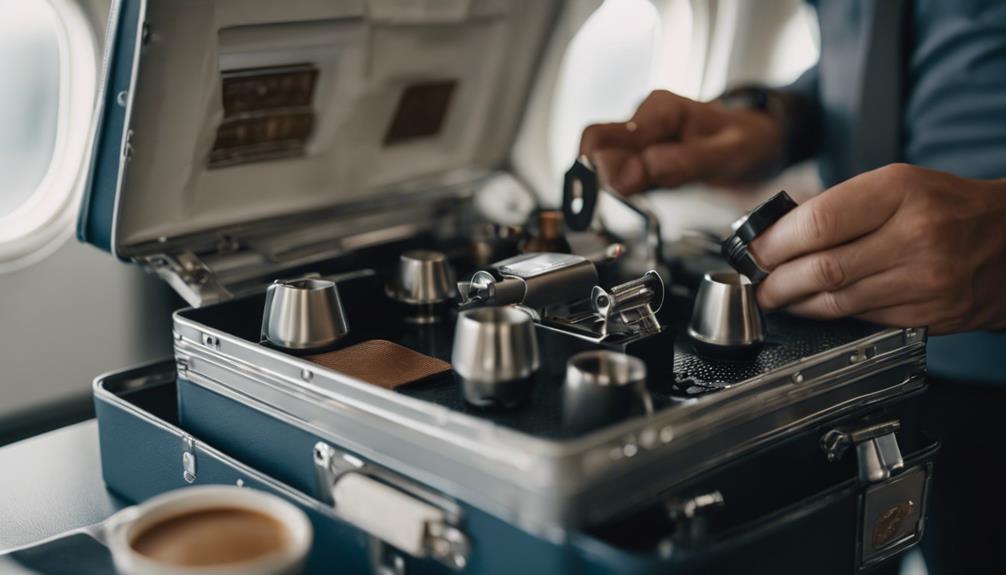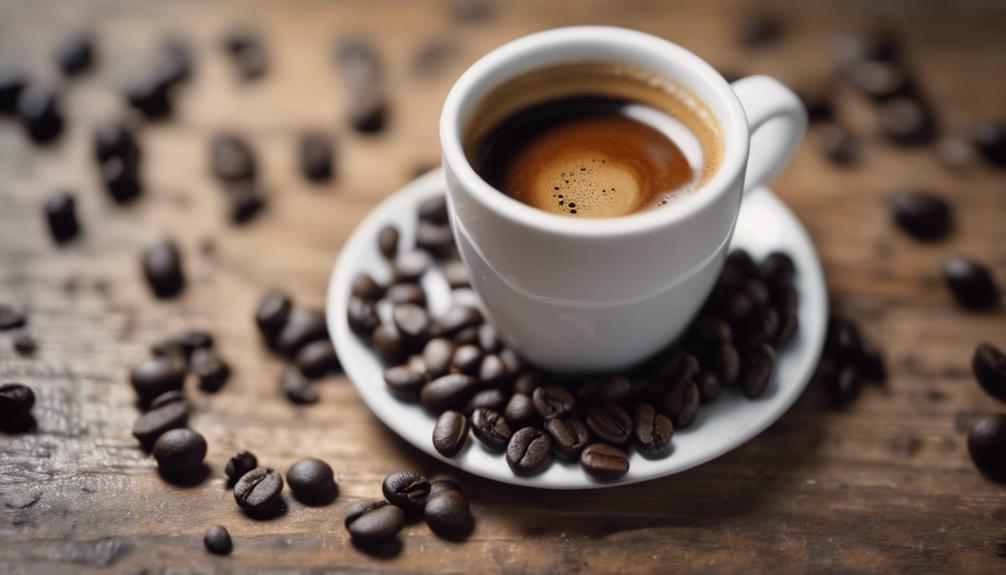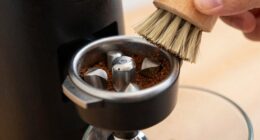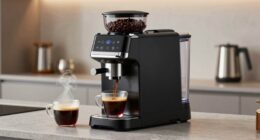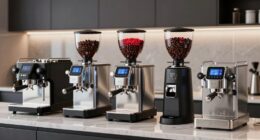You probably know that the daily pick-me-up from your espresso shots can be a mixed blessing, giving you a much-needed energy boost while also potentially posing health risks if consumed excessively. Four shots of espresso contain around 256 mg of caffeine, which is close to the FDA’s recommended daily limit of 400 mg. However, individual tolerance levels and health factors can affect how your body reacts to caffeine. Drinking more than six shots may surpass the recommended caffeine intake, leading to symptoms such as dizziness, jitteriness, and anxiety. Knowing your personal caffeine limits is crucial – do you want to learn how to find a healthy balance? You might consider trying decaffeinated espresso or other low-caffeine options to cut down on your overall caffeine intake. It’s also important to be mindful of the caffeine content in espresso shots when you order from coffee shops, as it can vary depending on the type and size of the drink. By understanding your own tolerance levels and making informed choices, you can savor your espresso without compromising your health.
Key Takeaways
- The FDA recommends a maximum daily caffeine limit of 400 mg, equivalent to roughly four to five shots of espresso.
- Consuming more than six shots of espresso may exceed recommended caffeine limits and lead to adverse health effects.
- Individual caffeine tolerance factors, such as genetic makeup, age, and health conditions, influence the safe amount of espresso consumption.
- Excessive espresso consumption can lead to symptoms like dizziness, fever, diarrhea, anxiety, and heart disease, indicating caffeine toxicity.
Lethal Caffeine Intake Threshold
Reaching the lethal caffeine intake threshold can be a serious concern for coffee and espresso lovers, as consuming too much caffeine can have devastating consequences. You might be wondering, how many shots of espresso is too much? The answer lies in understanding the lethal dose of caffeine, which is estimated to be around 10,000 mg. To put this into perspective, that's equivalent to approximately 156 shots of espresso or 105 cups of coffee.
As a healthy adult, your maximum daily intake should be around 400 mg of caffeine, which translates to 4-5 shots of espresso. However, it's crucial to recognize that individual tolerance to caffeine varies considerably. What might be safe for someone else mightn't be for you.
Be cautious not to exceed your personal limit, as symptoms of caffeine toxicity can arise quickly. These include dizziness, fever, diarrhea, anxiety, and heart disease. Remember, it's always better to err on the side of caution and monitor your caffeine intake to avoid reaching toxic levels.
Health Benefits of Moderate Espresso
As you explore the benefits of moderate espresso consumption, you'll discover that it can give you a cognitive function boost, making you more alert and focused.
You'll also find that espresso is an antioxidant-rich beverage, which can lead to a range of benefits for your overall health.
Additionally, moderate espresso intake can even improve your physical performance, giving you the energy and drive to take on your day.
Cognitive Function Boost
While you may not think of espresso as a brain-boosting beverage, moderate consumption has been shown to greatly enhance your cognitive function. By drinking around four shots daily, you can improve your memory and cognitive performance through increased dopamine production.
This moderate espresso consumption can also provide health benefits, such as protecting your brain health and potentially lowering the risk of neurodegenerative diseases like Alzheimer's and Parkinson's.
Furthermore, the caffeine in espresso can greatly enhance your alertness and focus, making it beneficial for cognitive tasks. As a regular espresso drinker, you may experience better mood regulation, which can indirectly support your cognitive performance and mental clarity.
Additionally, moderate caffeine intake has been shown to improve reaction time and cognitive processing speed, contributing to overall mental efficiency. With these benefits, it's no wonder that moderate espresso consumption can give your cognitive function a much-needed boost.
Antioxidant-Rich Beverage Benefits
You can also reap the rewards of espresso's high antioxidant content, which offers a multitude of health benefits when consumed in moderation. These antioxidants help combat oxidative stress, reducing the risk of chronic diseases like cancer.
Moderate espresso consumption has also been linked to improved insulin sensitivity, which may lower the risk of Type 2 diabetes.
Here are just a few ways espresso's antioxidants can benefit your health:
- Improved cardiovascular health: Regular espresso intake may promote better blood flow and reduce the risk of heart-related diseases.
- Enhanced cognitive function: The caffeine in espresso can increase dopamine production in the brain, boosting cognitive function and memory.
Improved Physical Performance
Boost your workout routine with moderate espresso consumption, which can greatly enhance your physical performance by increasing endurance and reducing perceived exertion during exercise. As you consume 3-4 shots of espresso per day, you'll experience improved physical performance thanks to the caffeine content. This stimulant increases adrenaline levels, helping you power through high-intensity activities with ease.
| Benefits of Espresso Intake | Effects on Physical Performance |
|---|---|
| Boosting Endurance | Increases stamina during exercise |
| Improving Reaction Times | Enhances speed and agility |
| Enhancing Focus and Mental Clarity | Sharpens concentration and decision-making |
| Supporting Recovery | Reduces muscle inflammation and oxidative stress |
Caffeine Content in Espresso Shots
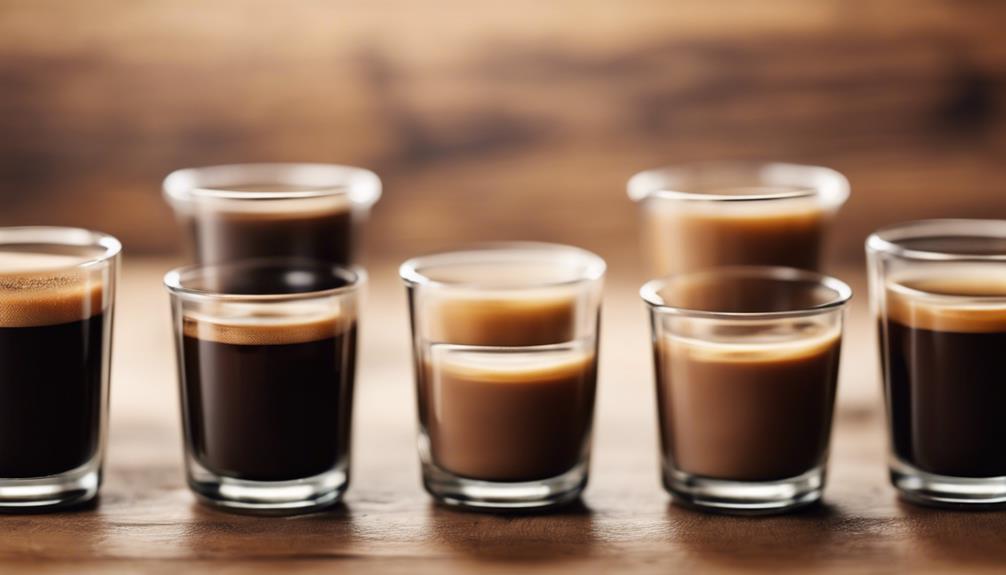
As you consider your daily espresso habit, it's important to understand the amount of caffeine you're consuming.
On average, a standard shot of espresso packs around 68 milligrams of caffeine, but this can vary greatly depending on factors like bean type and preparation method.
You'll want to know how these variables impact the caffeine content in your shots to make sure you're staying within a healthy range.
Espresso Caffeine Amounts
Consuming a standard shot of espresso, which packs approximately 64 milligrams of caffeine into its 25 milliliters, immediately reveals the beverage's concentrated nature. This amount of caffeine is considerably higher than what you'd find in a typical cup of coffee.
To put it into perspective:
- Four shots of espresso would amount to around 256 milligrams of caffeine, a substantial intake.
- In comparison, an 8-ounce cup of drip coffee typically contains about 95 milligrams of caffeine, highlighting the higher caffeine concentration in espresso.
When considering your espresso caffeine amounts, it's vital to remember that the amount of caffeine in coffee can vary greatly. Factors like bean type, grind size, and brewing method can influence the caffeine content.
Darker roasts, for instance, might have slightly less caffeine. By being mindful of your individual tolerance and the health facts surrounding caffeine, you can enjoy your shots of espresso while maintaining a healthy balance.
Caffeine Content Variability
You'll find that the caffeine content in your espresso shots can vary greatly depending on factors like the type of coffee beans used and the brewing method employed. The amount of caffeine per shot can fluctuate, affecting the total amounts of caffeine you consume. As you drink coffee, it's crucial to take into account the caffeine content variability to avoid potential health risks.
Here's a breakdown of the caffeine content in different types of coffee:
| Coffee Type | Caffeine per 25ml | Caffeine per 8oz |
|---|---|---|
| Light Roast Espresso | 68mg | – |
| Dark Roast Espresso | 63mg | – |
| Average Drip Coffee | – | 95mg |
| Strong Drip Coffee | – | 120mg |
| Espresso (average) | 65.5mg | – |
As you can see, the caffeine content can vary considerably depending on the type of coffee and brewing method. Even within espresso shots, the caffeine content can differ based on the coffee beans used and the grind size. Be mindful of these variations to enjoy your espresso shots responsibly.
Espresso Vs Coffee: Caffeine Comparison
When it comes to caffeine intake, the choice between espresso and coffee ultimately boils down to serving size and brewing method. You might be surprised to learn that a standard shot of espresso (about 25 ml) contains around 64-68 mg of caffeine, while an 8-ounce cup of brewed coffee typically has about 95 mg of caffeine.
Here's a breakdown of caffeine content in different types of coffee:
- A single shot of espresso: 64-68 mg
- An 8-ounce cup of French press coffee: up to 223 mg
As you can see, espresso has a higher caffeine concentration per ounce compared to coffee, but due to its smaller serving size, total caffeine intake may be lower. This highlights the significance of serving size in coffee consumption.
If you're concerned about your caffeine intake and the potential risk of heart problems, it's crucial to be mindful of how much coffee you're drinking and how it's brewed. By understanding the differences in caffeine content between espresso and coffee, you can make informed choices about your daily coffee habit.
Individual Caffeine Tolerance Factors

Your sensitivity to caffeine's effects can vary greatly depending on your genetic makeup, and this natural variation plays a significant role in determining your individual caffeine tolerance. You may metabolize caffeine quickly or slowly, which affects how you respond to it.
Age, hormonal changes, and overall health also influence your body's response to caffeine. If you're a regular coffee drinker, you may have developed a higher tolerance over time, allowing you to consume more caffeine without experiencing adverse effects.
However, personal health conditions, such as anxiety disorders, can decrease your caffeine tolerance, leading to heightened sensitivity to its effects. It's important to monitor your reactions to caffeine, as the recommended daily limit of 400 mg may not be suitable for everyone, especially those with lower tolerance.
Don't assume you can handle caffeine in one shot; pay attention to how your body reacts. By understanding your individual tolerance to caffeine, you can enjoy your espresso shots while maintaining your health.
Safe Daily Espresso Consumption Limits
The FDA's recommended daily caffeine intake of 400 mg serves as a benchmark for healthy adults, translating to roughly four to five shots of espresso. However, it's important to remember that individual tolerance to caffeine varies greatly, and you might experience negative effects even within this limit.
To determine your safe daily espresso consumption limits, consider the following:
- One standard shot of espresso contains approximately 64 mg of caffeine, so consuming more than six shots could lead to exceeding the recommended caffeine limit.
- Pregnant individuals and those with certain health conditions should limit their caffeine intake to 200 mg per day, approximately two shots of espresso.
Caffeine Toxicity Symptoms and Risks
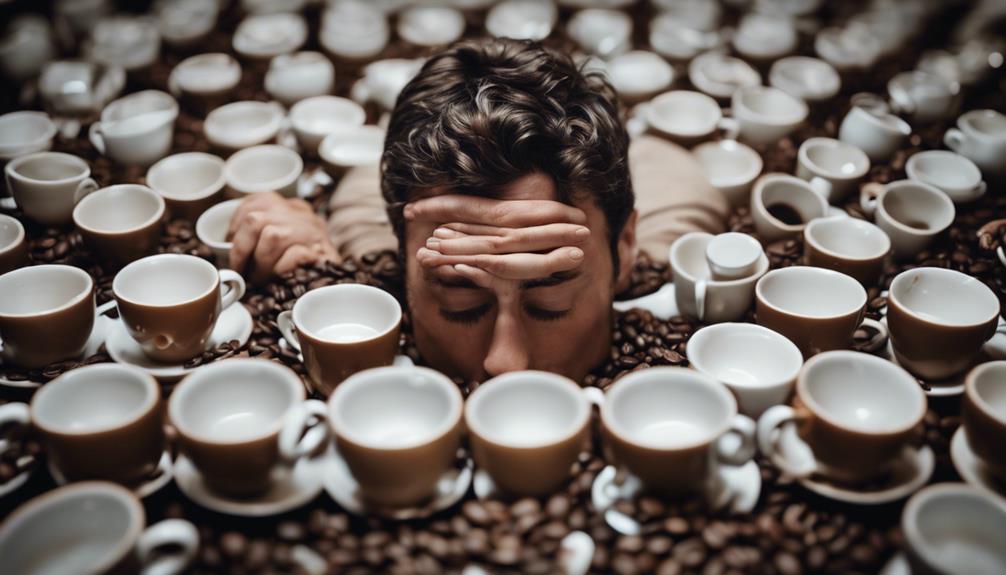
Consuming espresso in excess can push you into caffeine toxicity territory, where symptoms like dizziness, anxiety, and insomnia become a harsh reality. You may experience a racing heart, jitteriness, or an overwhelming sense of unease. These symptoms can be a sign that you've crossed the line into caffeine toxicity.
Excessive consumption can lead to more severe health effects, including gastrointestinal disturbances, fever, and palpitations. In extreme cases, it can even result in seizures or death.
The daily limit of 400 mg of caffeine is in place for a reason. Exceeding this amount can increase the risk of adverse health effects. It's crucial to practice moderation when it comes to your espresso habit.
You might think you can handle multiple shots, but your body may be telling a different story. Pay attention to your body's signals, and don't ignore symptoms like jitteriness or anxiety. They may be warning signs that you're approaching caffeine toxicity.
Be mindful of your consumption, and prioritize your health by staying within the recommended daily limit.
Monitoring Personal Caffeine Intake
You're likely wondering how to avoid crossing that fine line into caffeine toxicity, and it starts with tracking your daily espresso shots. Monitoring your personal caffeine intake is vital to avoiding health risks. The FDA recommends a maximum daily intake of 400 mg, roughly four to five shots of espresso. However, individual tolerance to caffeine can vary widely, making it essential to monitor your personal reactions.
Here are some key things to keep in mind:
- Keep track of your espresso consumption: Count the number of shots you drink throughout the day to maintain safe levels.
- Be aware of your body's signals: If you experience symptoms like a rapid heart rate or jitteriness, it may be a sign of excessive caffeine intake.
Frequently Asked Questions
How Many Shots of Espresso Is Unhealthy?
You're wondering how many shots of espresso is unhealthy? Well, exceeding four to five shots daily can cause anxiety, insomnia, and other negative effects, but for you, even one or two might be too much, depending on your caffeine sensitivity. It’s important to be aware of your own tolerance and to listen to your body’s signals. Additionally, the espresso caffeine content can vary depending on the type of coffee bean and the brewing method, so it’s a good idea to pay attention to how different sources of espresso affect you. Remember, moderation is key when it comes to consuming caffeine, and it’s always best to consult with a healthcare professional if you have any concerns about your caffeine intake. If you’re unsure about how much caffeine in espresso is safe for you, consider experimenting with smaller amounts and gradually increasing your intake as you gauge your body’s response. Keep in mind that espresso is more concentrated than other forms of coffee, so even a single shot can pack a punch. Ultimately, the best approach is to be mindful of how much caffeine you’re consuming and to make adjustments based on how it affects your overall well-being.
Is Drinking 3 Espresso Shots a Day Bad?
You're wondering if drinking 3 espresso shots a day is bad for you? Generally, it's not, as long as you're a healthy adult; however, you should be aware of your personal caffeine tolerance and potential health risks.
Is 4 Shots of Espresso at Once Too Much?
"You're probably thinking, 'Four shots of espresso at once? No big deal!' But trust us, it's a big deal – you're basically mainlining caffeine, and your heart (and stomach) might just protest with anxiety and jitters."
What Happens if You Drink 6 Shots of Espresso?
You're pushing the limits with 6 shots of espresso, taking in a whopping 408 mg of caffeine! You'll likely feel jittery, anxious, and experience insomnia, digestive issues, and a racing heart.
Conclusion
You've navigated the world of espresso, and now it's time to brew a safe habit.
Remember, caffeine is a double-edged sword – it can sharpen your focus or shatter your nerves.
As you savor each shot, keep your intake in check, lest you cross the threshold from energized to exhausted.
Like a master barista, balance is key; too much espresso can be a recipe for disaster, but just the right amount can be a delicious catalyst for productivity.
